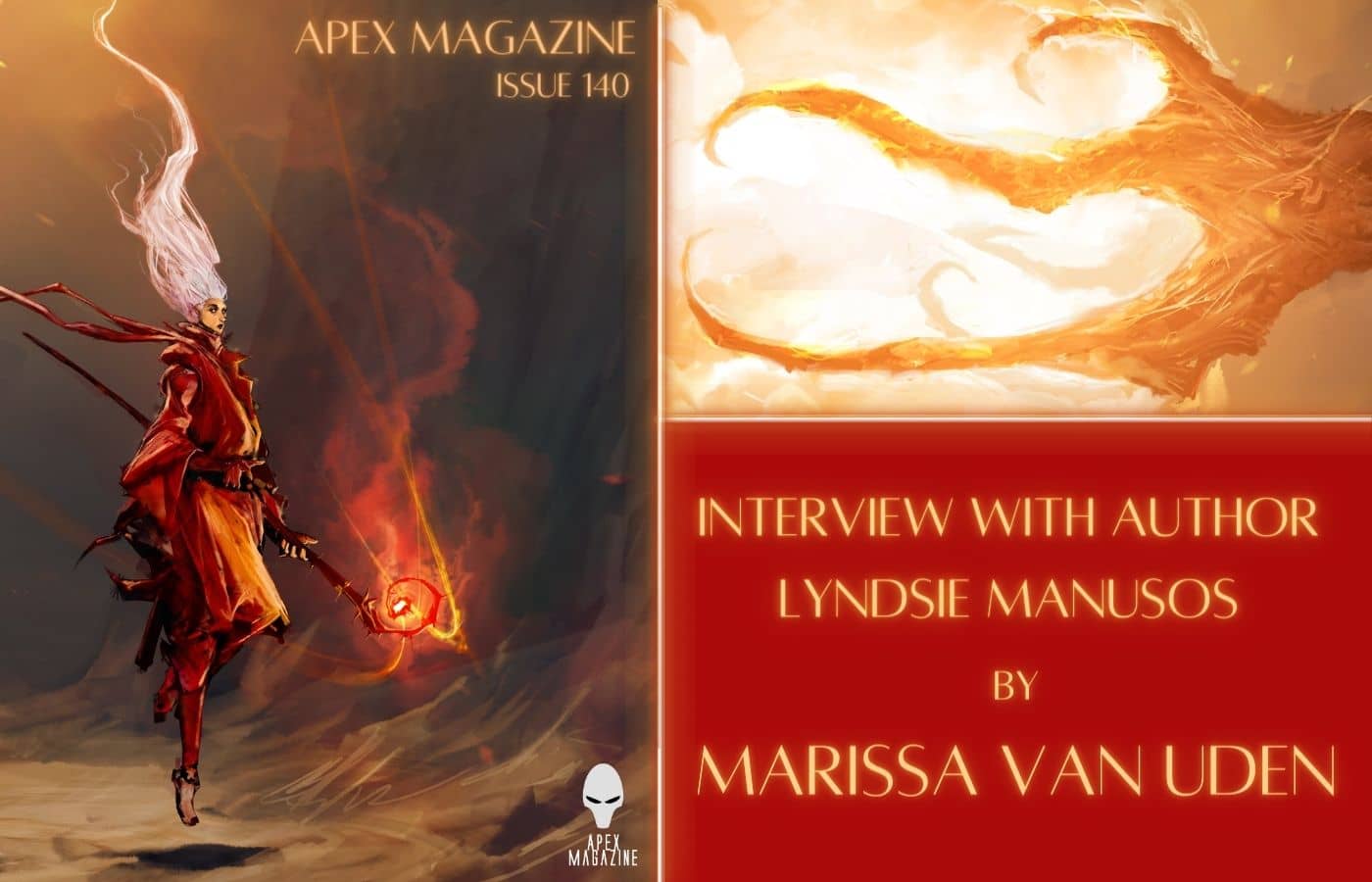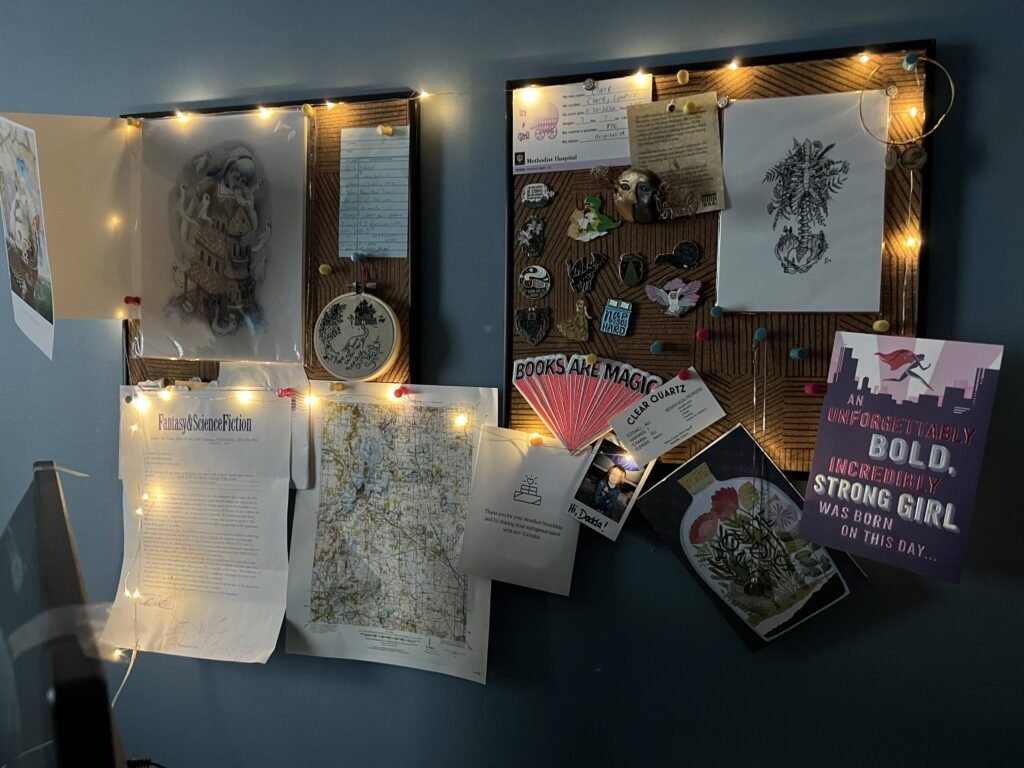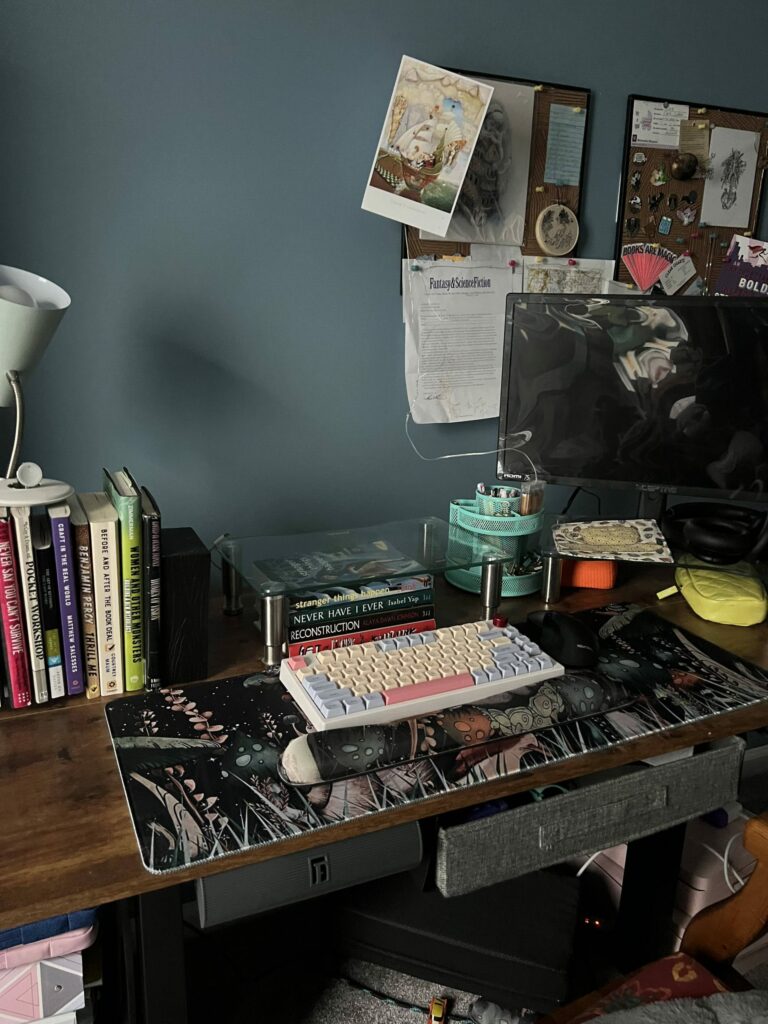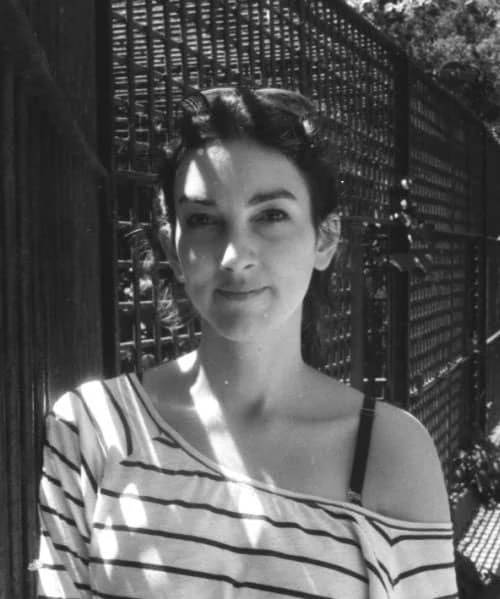
In the beautiful and intricate “Whisper Songs,” an organization known as Amplexum sends out veiled workers (Sonos) to harvest the songs of fallen birds, the records of a dying world. On the face of it, they are collecting these songs to store in Arks, a kind of huge archive; but in this story, three characters with very different relationships to Amplexum discover that there is so much more going on.
Lyndsie Manusos’s fiction has been published in Lightspeed Magazine, The Magazine of Fantasy & Science Fiction, The Deadlands, and other publications. Her work has appeared on the Locus Recommended Reading List, been nominated for a Pushcart, and mentioned in one of Tor.com’s Must-Read Speculative Fiction roundups. She’s the associate flash fiction editor for jmww, writes for Book Riot and Publishers Weekly, all while trying to keep up with her two young children. At some point, she’ll take a nap.
Marissa van Uden: Thank you for taking the time to chat with us, Lyndsie! This is such a haunting story filled with deep loss, mourning, and a quiet acceptance of a very damaged and increasingly empty world. It really lingered with me. To start with, could you tell us which elements first sparked the idea for “Whisper Songs” and how the story developed from there?
Lyndsie Manusos: Thank you so much for your kind words. The initial inspiration for this story is a little hazy for me, because I remember starting this story during those dark months postpartum with my second child. Those first 12 weeks with a newborn are beautiful yet rough for parents, the hours melting together. I think I remember someone saying that every hour during that time is familiar, be it 3 p.m. or 3 a.m. I wanted to write a story that somewhat mirrored that experience, emotionally, while also reflecting on the world changing around me, contemplating the future laid before us all with climate change.
MVU: I especially enjoyed the banality of the Sono’s job in contrast to their enigmatic, almost nightmarish presentation. To outsiders they are faceless, the mysterious black-veiled harvesters of birdsong, and yet as we get to know one of them, they are revealed to be just tired everyday workers like anyone else, struggling with anxiety issues, pulling twelve-hour shifts to pay off medical debts. The Sono character reminded me of some of the staff from Jeff VanderMeer’s Southern Reach—that mix of the supernatural weird with the bureaucracy of ordinary life. How did the image of the Sono come to you, and what inspired you to show them this way?
LM: In early drafts, the Sono was purely this outward-facing enigmatic character. But it’s important to remember that much of the workforce of large corporations or government entities have many layers and few privileges, especially those who live hand to mouth with minimum wage. I wanted to add depth, another perspective of someone who wants to do their job right, to have an income, while wrestling with the duties and ethics of the job.
 My inspiration board, with artwork from various artists, including a stunningly-haunting embroidery by K.C. Mead-Brewer. There are also encouraging notes from friends and family that I return to whenever I have self-doubt.
My inspiration board, with artwork from various artists, including a stunningly-haunting embroidery by K.C. Mead-Brewer. There are also encouraging notes from friends and family that I return to whenever I have self-doubt.
MVU: The three characters—the Mother, the Traveler, and the Sono—give us a rich view of this deteriorating world. There is a mood that permeates all of their lives: “The world was shit. It was in a constant state of betrayal, and everyone was either a part of that betrayal or in mourning because of it,” and yet each character deals with it in very different ways, ranging from complicity to curiosity to rebellion. Who was your favorite character to write, and which was the most challenging, and why?
LM: What an excellent question. I think all the characters in this story contain a part of me that I have wrestled with at some point or another: the Mother, especially, but also the Traveler who seeks knowledge, and the Sono who yearns for balance and forgiveness.
MVU: I read another of your stories, the beautiful A Case for De-Extinction at the End of the World in SmokeLong Quarterly, that also deals with themes of species loss, mourning, and resurrection. What draws you to these themes? Is this something that has always fascinated you since childhood?
LM: Oh, I love that SmokeLong story so much, thank you for reading it! Yes, I have always had that fascination. When I was little, I remember wanting to be an archeologist, or an astronomer, or an inventor (I remember attempting to invent a vest for manatees that protected them from boat propellers). Being a writer allows me to explore all these childhood fascinations, to hold onto that curiosity, and like the Traveler, hold tight to curiosity and the quest for knowledge and awareness.
MVU: Do you have a favorite bird, and/or a favorite birdsong you love to hear?
LM: Lately, I am partial to a robin call. There’s a pair of robins that build a nest in my children’s fort every spring. We try to give them space, but when we’re playing nearby, the nesting robin will fly out and watch us from the roof or fence, chirruping, or mostly scolding us for interrupting. It’s nice reminder that parents of all species can be frustrated and tired.
MVU: Aw, robins as tired parents scolding the local humans is such an adorable image. In addition to being a prolific writer and poet, you’re also a mother yourself, and a bookseller, a reviewer, and an associate flash fiction editor. That’s so impressive! What does your daily or weekly routine look like in terms of writing and reading habits. Do you have any special rituals to get into writing mode?
LM: My mission lately is to do what I can when I can. Most days I don’t feel productive at all! I don’t have a set time or ritual when it comes to writing. Whenever there is a gift of time, I try to utilize it as best as I can. Sometimes that requires resting rather than writing. Being a stay-at-home mom, freelancer, bookseller, and editor is exactly what I want to be, and it’s also super challenging and exhausting. I am extremely privileged with the support I have that makes all these facets possible: I am able to work at the bookstore because my mother-in-law watches my kids each Friday; whenever my parents are in town, I’ll find time to write; and my husband will often send me on writing trips to a coffeeshop whenever possible. I am immensely grateful for all of this. During the week, I write whenever my kids are playing independently or, mostly, after they go to bed.
 This desk in our bedroom is where I always long to write, though sometimes the kitchen table is easier. I have a stack of some of my favorite short story collections — by Kelly link, Isabel Yap, and Alaya Dawn Johnson — just beyond my keyboard, and a shelf of craft books I like to have on hand.
This desk in our bedroom is where I always long to write, though sometimes the kitchen table is easier. I have a stack of some of my favorite short story collections — by Kelly link, Isabel Yap, and Alaya Dawn Johnson — just beyond my keyboard, and a shelf of craft books I like to have on hand.
MVU: What is your favorite place to read books … a favorite chair or spot in the garden? Or do you carry books wherever you go and read in moments of downtime?
LM: I carry books everywhere! Even when I know I won’t have time, because you never know, right? I carry a small book in my fanny pack next to the wipes, or in a tote bag I keep in the car. I really love my desk, particularly the bulletin board above it that’s full of artwork, notes, and gifts from loved ones. Lately, I tend to write at either the kitchen table or in bed. Wherever I can sit down to read or write is my favorite place. Once the kids are older, I imagine I’ll be at my desk more often.
MVU: Love it! Thank you so much for joining us today. Can you share anything about what you’re working on next? And do you have any upcoming publications you’d like to share with our readers?
LM: Currently, I am working on edits for my lake fantasy novel, attempting to write/edit short fiction pieces to submit, and my usual deadlines of Book Riot articles and PW reviews. I hope I’ll get the novel edits right so it finds a good home. Thank you so much for these lovely questions. It’s such an honor to be in Apex Magazine.









